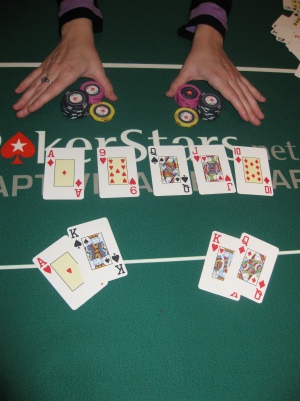|
|

Split Pot - A pot that is split by two or more players.
Sometimes, at the conclusion of the hand, more than one player is entitled to a part of the pot. A split pot is a pot that is split
among 2 or more players. Depending upon the game that you are playing, this can be a relatively rare occurrence, or a commonplace
event.
In a hi/lo game, like Omaha Eight or Better (O8), by rule half of the pot is awarded to the high hand and half of the pot is awarded
to the low hand, so long as a player makes a
qualifying low hand. This makes split pots a very common occurrence in hi/lo games. Split pots occur so frequently in these games
that they are often referred to as “split pot games.”
In these games, splitting the pot has strategic implications. Players may play for the high side of the pot, the low side, or both.
Here, it is best to have a multiway action hand which has the potential to win both sides of the pot. This is why players tend to
focus on hands which contain A-2, along with a valuable combination of high cards. The most powerful hand before the flop in O8 is
A-A-2-3, double suited. Hands with high only values or low oriented hands can also be valuable, depending upon the flop.
It is important to realize that it is much easier to make a low hand in these games than it is to make a high hand. In fact, lows
occur with such frequency in O8, that it is relatively common for more than one player to make a nut low during the same hand. When
this happens, multiple players must split the low side of the pot evenly. If there are one high hand and two low hands, the high hand
will receive 50% of the pot, and the two low hands will each receive 25%. For the holders of the low hands, this is called “getting
quartered.” If there are only three of you in the pot in this situation (one high and two lows), the low will be putting in 33% of the
money, but you will only be receiving back 25% of the money at the conclusion of the hand. As you can see, it is easy to lose money
getting quartered with the nut low. You will need substantial action from the rest of the field, if you are to make any profit at all
on a hand which you are getting quartered on. Many newbies do not understand the math on this and insist upon raising and reraising
anytime that they make the nut low. This is a bad idea and it will annoy the experienced players at the table to no end. To be
effective, you must learn not to overvalue the low. Since the low must qualify in order to be eligible for any part of the pot, and
the risk of getting quartered is substantial, it is often better to make the high hand than the low. Sometimes three or more people
will all make the same low on a hand, but a split pot on the high side occurs with much less frequency. When a multi-way low split
occurs, it can result in each low hand getting a sixth, or less, or the pot. This is why the very best hands have good potential to
win both sides of the pot.
Split pots occur more infrequently in high only games like Texas Hold’em. In these games, the low is worthless and is not entitled to
any of the pot. In order for a split pot to occur in a Hold’em game, two or more players must make identical high hands. Players may
make identical hands using two, one, or none of their hole cards. If no hole cards are played, players will be
playing the board, and all active players
will be entitled to an equal share of the pot. More frequently, players will split a pot because they
complete their hand with the same single
hole card. This happens most often when a single card is needed to complete a straight, or when the board is such that only a one card
kicker plays. It is not possible for a
chop on the high side to occur when the winning
player completes a flush using either one or two hole cards. Players will also split the pot anytime there are two or more winning
hands with exactly the same two playing hole cards.
Usage: Stud Split, Splitting the Pot
Previous Poker Term: Small Blind
Next Poker Term: Spread Limit |
|









